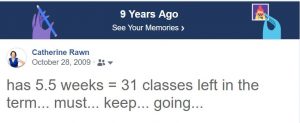I’ve had many conversations lately about what it’s been like to return from Sabbatical. My year away from the hectic pace of my regular teaching and service schedule gave me space to think big, to write, to follow my curiosities in work and life, to travel, and to prioritize care for myself and my loved ones. I learned to appreciate that I am not the sum of my work, what it feels like to be truly well-rested, that actually I am not that important (lots of amazing things still happen without me — this might sound arrogant, but it was an important realization for allowing myself to unplug and say no), and that I don’t have anything left to prove to others–so I can start building my career on my own terms (thanks therapy for this last one!). I developed an Educational Leadership Statement (triggered by the SoEL Certificate program) which helped me to evaluate my suite of commitments/projects and set two priority areas (faculty development and curriculum) that I can use to make decisions about what to say yes to. Before sabbatical I had never in my life taken time away, and I am forever grateful for that chance to catch my breath and re-evaluate my life.
Returning was, as expected, a bit of a shock. I taught about 500 students each term, and I had lots of energy for large-scale renewal of lessons (including switching a textbook in one case — something I’d been putting off for a while). Lesson and course planning consumed me. Lessons that used to take an hour or two to prepare often took closer to 5 — which is not easily sustainable for 6 different hours (9 total) of class prep per week! I felt I became even more accessible for and responsive to my students, which also takes time and mental and emotional energy (including ~daily decision-making that has logistical + ethical implications).
But here’s where I think the effect of sabbatical came through: I let myself do this essential work of good teaching and let other things go. I wasn’t very good at responding to email most of the time, instead taking more of a triage approach (spend about half an hour once or twice a day putting out fires, and let the rest accumulate until I could schedule more time to deal with it). I resigned from at least two committees. I said no to various “small” things like giving workshops or reviewing. I worked Sundays (teaching Monday at 9, 10, and 12 requires that for me), but I still left work at 3 on Mondays and Thursdays so I could get to my yoga class on time because I had learned yoga improves my well-being.
All this saying no had some noticeable effects. I still didn’t work evenings or Saturdays to “make up” for the work I needed to do during the day. My job (JOB–not my life) is teaching first, and I am not obligated to work 60 hour weeks to make everything else also equally first. I got used to disappointing people, which is something I have tried to avoid at much cost throughout my life personally and professionally. I regularly began emails with apologies for tardiness, I failed to call meetings that should have happened but were not actually absolutely essential, I declined invitations regularly. But I also learned to re-frame that “no” as an opportunity to nominate someone else. People think of me for roles, and that’s amazing and wonderful — I’ve worked really hard for my work to be respected! But that doesn’t mean there aren’t other people around who could do a great job and learn/build their CVs too. I now think of a no as a chance to mentor someone into a new role for them. I became (professionally) lonely. As I wrapped up various commitments and longer-term projects (deliberately without replacing them), removed committees and other work from my days, I realized that a growing discontent inside me was loneliness! Teaching is (mostly) fun and is (for me) very social with students… yet I realized more than ever that sitting at tables with colleagues who also love teaching is essential professional fuel for me. As I rebuild my smaller suite of commitments, I am paying keen attention to joining tables where conversations and initiatives are energizing.
As I realize it’s time for me to do other work this morning, I’m left with feeling a sense of extreme gratitude for my job and my career. Being an Educational Leadership (EL) faculty member at UBC means I work really hard to do the best work I can do for my students, colleagues, and institution–just like everyone around me. And it also comes with tremendous opportunity and autonomy to continually craft and re-craft my own teaching-focused career. I think everyone deserves a sabbatical, and I’m grateful to be among those who get one.


 Follow
Follow